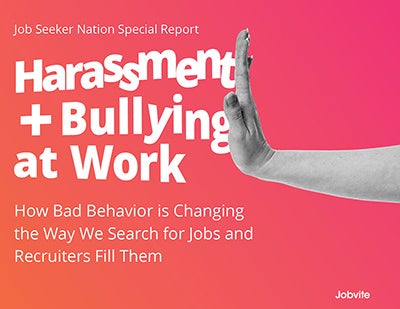Special Report: Harassment + Bullying at Work
 It’s no secret that company culture and values play a huge role in governing the modern workplace. Building a strong, positive culture helps companies attract and retain a talented, dedicated workforce.
It’s no secret that company culture and values play a huge role in governing the modern workplace. Building a strong, positive culture helps companies attract and retain a talented, dedicated workforce.
But a toxic environment can threaten to send employees straight out the door.
Over the last year, two important aspects of workplace culture have been placed under the magnifying glass: sexual harassment and bullying. Movements like #MeToo and #TimesUp make it clear that employees will no longer tolerate bad behavior in the workplace. Workers across industries are speaking out against inappropriate and abusive treatment in the workplace, and this call for reform is impacting the way employers build culture and employees evaluate companies.
After nearly a decade of polling job seekers across the country about how and why they look for work, we wanted to dig deeper into how much this inappropriate behavior influences the way people evaluate companies and select employers — and the overall impact it has on the recruiting industry.
In our first ever Harassment and Bullying Report, Jobvite partnered with Zogby Analytics to survey over 1,500 jobseekers about sexual harassment and bullying at work. The study examines frequency, reporting, retaliation — and also how these behaviors impact a person’s decision to apply for a company or leave their current one. We learned that job seekers won’t tolerate bad behavior, and it’s even enough to drive current employees away. The data provides important information about what truly matters for employees today — and how companies must adjust to build safe, secure, and engaging workplaces.
Some key findings include:
Job Seekers Won’t Stand for Harassment
- For those job seekers who dealt with a harassment issue, 82% report their company taking action in the situation — and 90% of those believe the company did so appropriately.
- Just 15% of job seekers report that their companies have changed its policies or made statements surrounding sexual harassment in light of recent movements.
- For those job seekers whose companies haven’t made changes, 13% would be more likely to leave the company because of it.
- For those workers that have felt or ever do feel threatened in the workplace — by bullying or sexual harassment —
- 68% would at least think about leaving
- 66% would actively pursue a new job
- 48% would leave the company without another job lined up.
Bad Behavior Drives Potential Employees Away
- Almost half (48%) of job seekers would be discouraged from applying to a company if they heard about a sexual harassment incident that occurred there.
- Women in particular would be less inclined to join (women: 57% vs. men: 43%).
- 63% consider it important to know about the sexual harassment policy of a company they are considering joining.
- How would they find out?
- Ask the recruiter — 45%
- Ask the hiring manager — 59%
- Ask someone on the interview team — 36%
- Ask a member of the executive team — 19%
- Do online research — 51%
- How would they find out?
Bullying: A More Pervasive Problem
- During the past two years, 14% of American workers were bullied at work, most often by managers (57%), peers (33%) and senior leadership (32%) — especially younger workers (19%) vs. older workers (9%)
- In theory, bullying victims say they feel slightly more comfortable reporting the issue — 77% of them would feel at least somewhat comfortable going to HR it — compared to 73% of victims of sexual harassment.
- However, bullying is less likely to be reported than sexual harassment.
- 58% of job seekers who have been bullied at work in the last two years didn’t report it (compared to just 33% of harassment).
To learn more about how bad behavior in the workplace impacts the employee and candidate experience, download this special report.